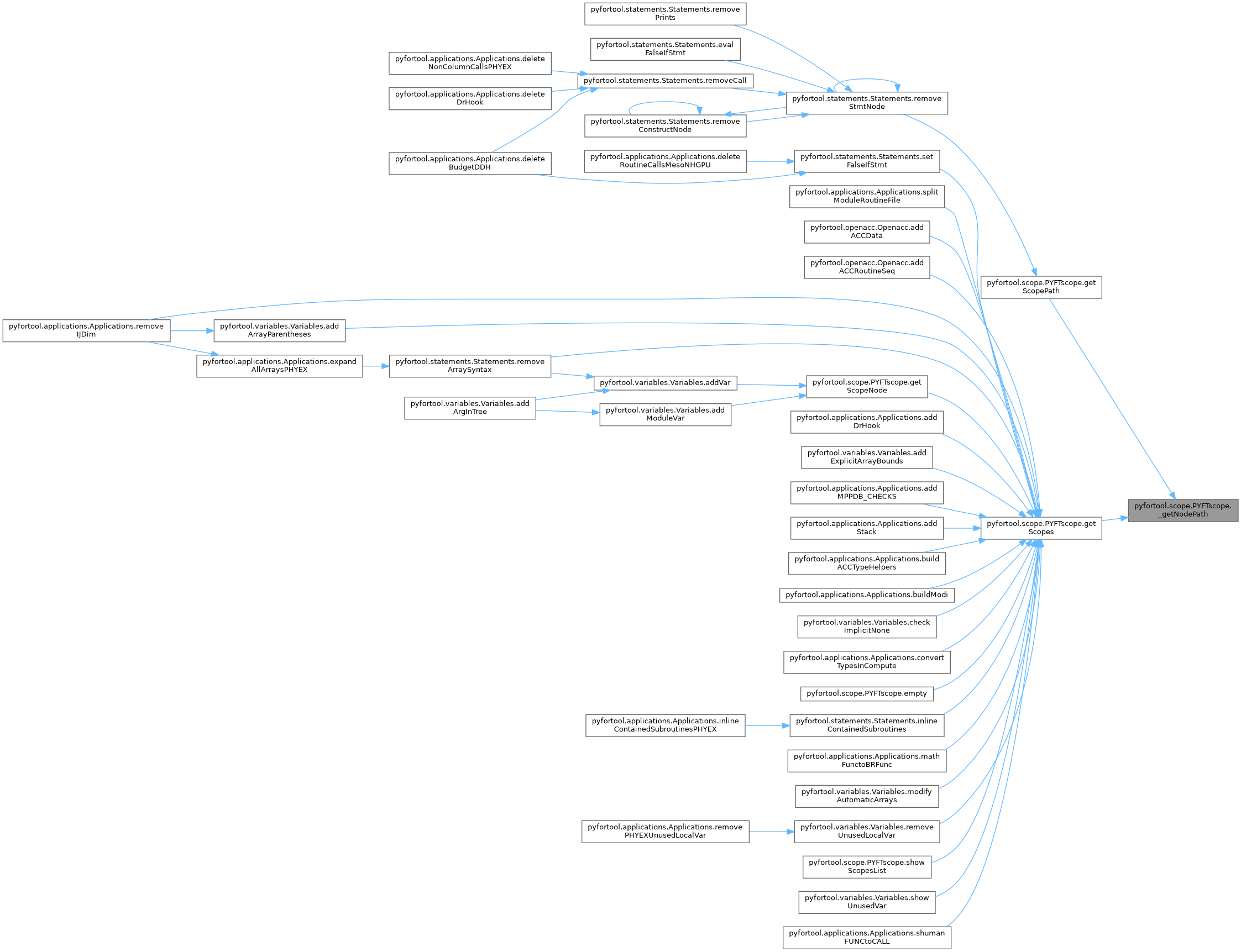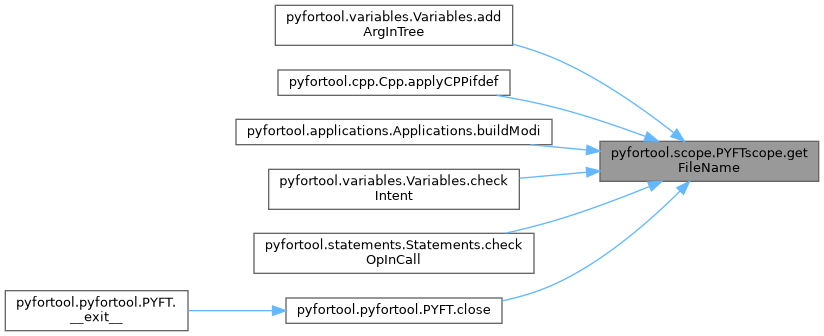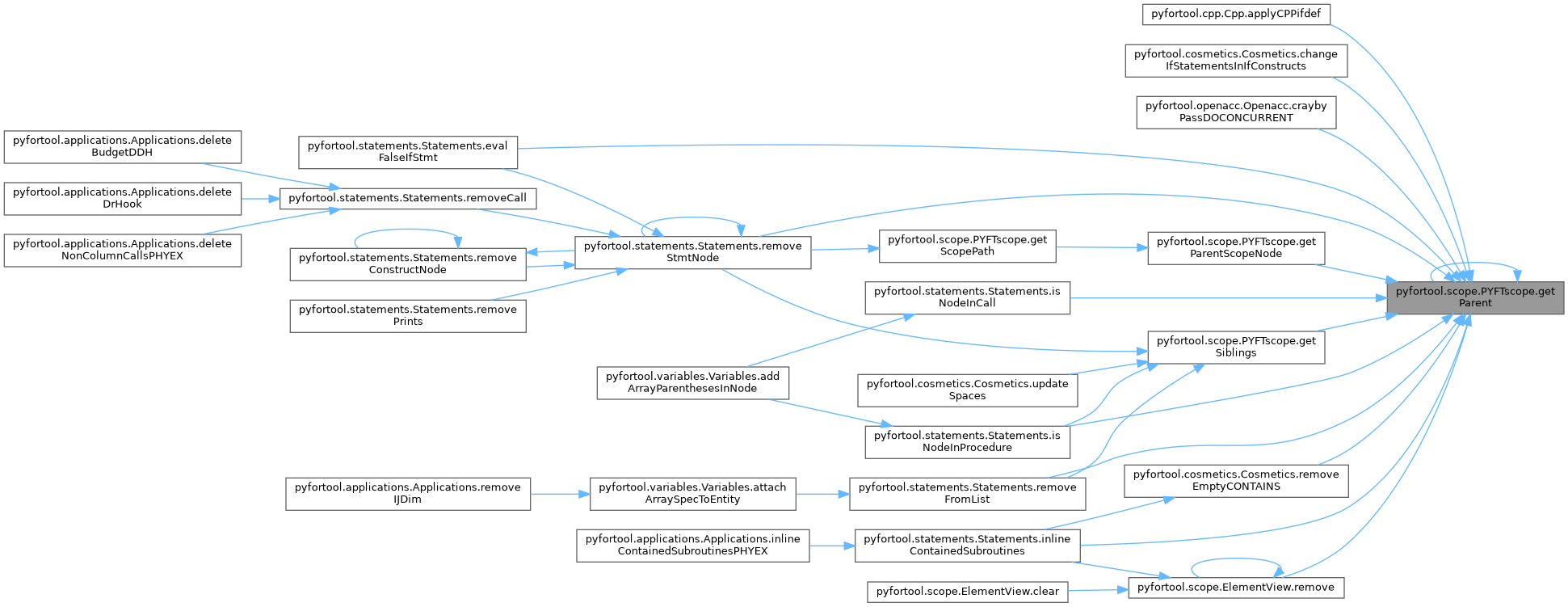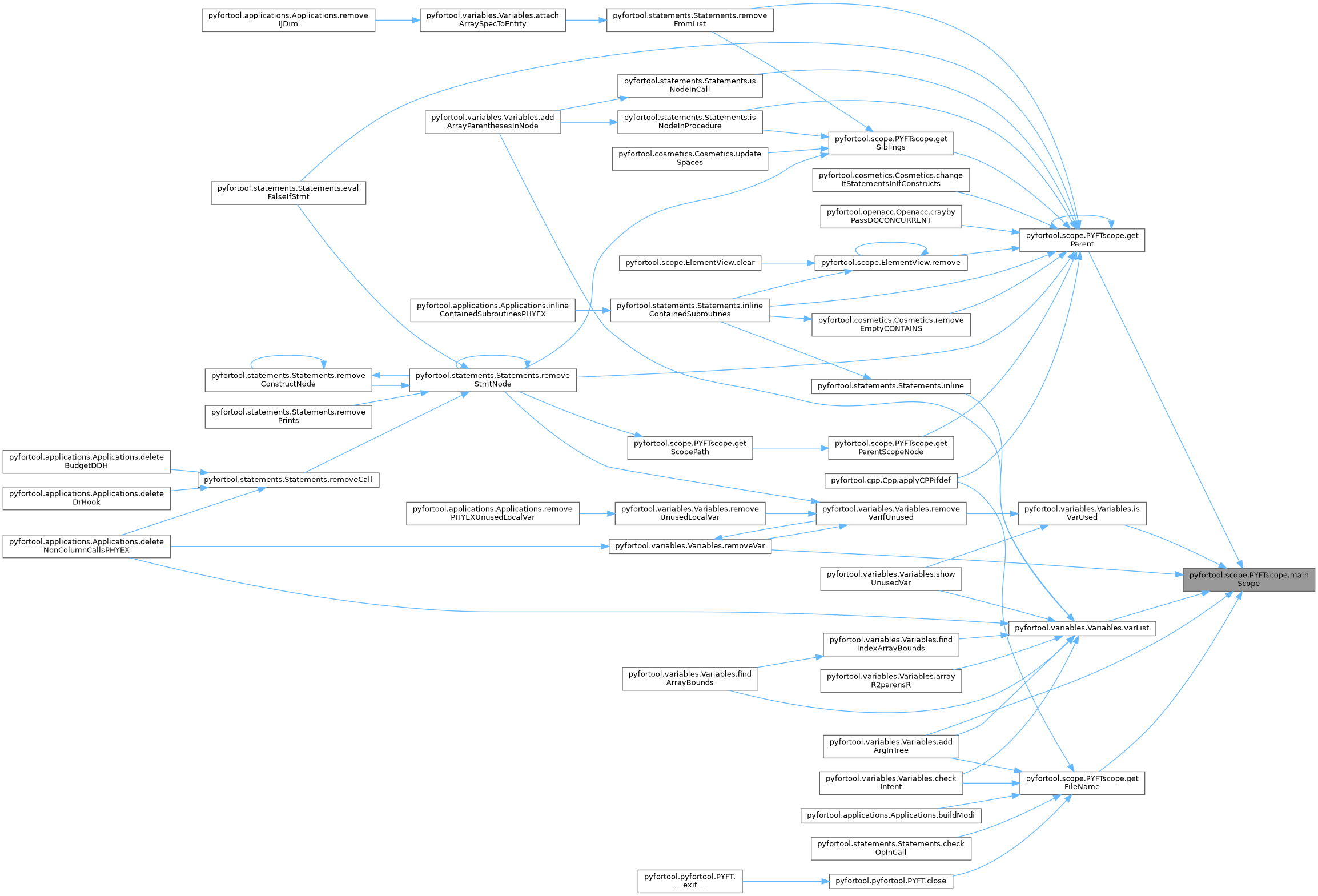Inheritance diagram for pyfortool.scope.PYFTscope:
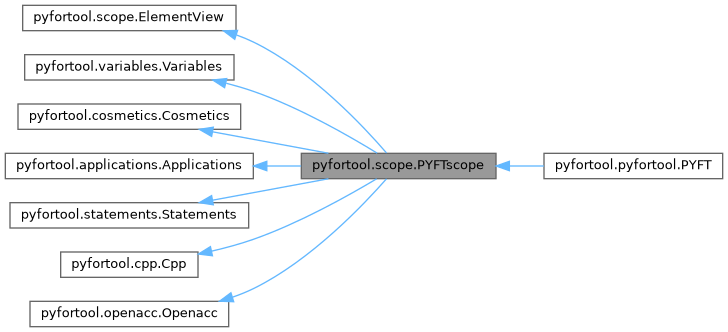
Collaboration diagram for pyfortool.scope.PYFTscope:
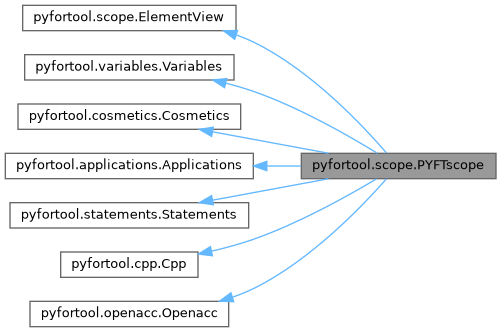
Public Member Functions | |
| __init__ (self, xml, scopePath='/', parentScope=None, enableCache=False, tree=None, excludeContains=False) | |
| __copy__ (self) | |
| __deepcopy__ (self, memo) | |
| __getattr__ (self, attr) | |
| path (self) | |
| mainScope (self) | |
| parentScope (self) | |
| getParent (self, item, level=1) | |
| getSiblings (self, item, before=True, after=True) | |
| showScopesList (self, includeItself=False) | |
| getScopes (self, level=-1, excludeContains=True, excludeKinds=None, includeItself=True) | |
| getScopeNode (self, scopePath, excludeContains=True, includeItself=True) | |
| isScopeNode (self, node) | |
| getParentScopeNode (self, item, mustRaise=True) | |
| getScopePath (self, item, includeItself=True) | |
| getFileName (self) | |
| empty (self, addStmt=None, simplify=False) | |
 Public Member Functions inherited from pyfortool.scope.ElementView Public Member Functions inherited from pyfortool.scope.ElementView | |
| tag (self) | |
| tail (self) | |
| text (self) | |
| findtext (self, *args, **kwargs) | |
| iterfind (self, *args, **kwargs) | |
| itertext (self, *args, **kwargs) | |
| __getitem__ (self, *args, **kwargs) | |
| __len__ (self, *args, **kwargs) | |
| __iter__ (self) | |
| find (self, *args, **kwargs) | |
| findall (self, *args, **kwargs) | |
| iter (self, *args, **kwargs) | |
| items (self, *args, **kwargs) | |
| clear (self) | |
| append (self, *args, **kwargs) | |
| extend (self, *args, **kwargs) | |
| __setitem__ (self, index, item) | |
| __delitem__ (self, index) | |
| insert (self, index, item) | |
| remove (self, node) | |
 Public Member Functions inherited from pyfortool.variables.Variables Public Member Functions inherited from pyfortool.variables.Variables | |
| varList (self) | |
| attachArraySpecToEntity (self) | |
| checkImplicitNone (self, mustRaise=False) | |
| checkIntent (self, mustRaise=False) | |
| removeVar (self, varList, simplify=False) | |
| addVar (self, varList) | |
| addModuleVar (self, moduleVarList) | |
| showUnusedVar (self) | |
| checkUnusedLocalVar (self, mustRaise=False, excludeList=None) | |
| removeUnusedLocalVar (self, excludeList=None, simplify=False) | |
| addExplicitArrayBounds (self, node=None) | |
| addArrayParentheses (self) | |
| addArrayParenthesesInNode (self, node) | |
| removeArrayParenthesesInNode (self, node) | |
| modifyAutomaticArrays (self, declTemplate=None, startTemplate=None, endTemplate=None) | |
| findIndexArrayBounds (self, arr, index, loopVar) | |
| arrayR2parensR (self, namedE, table) | |
| findArrayBounds (self, arr, loopVar, extraVarList=None) | |
| renameVar (self, oldName, newName) | |
| removeVarIfUnused (self, varList, excludeDummy=False, excludeModule=False, simplify=False) | |
| isVarUsed (self, varList, exactScope=False, dummyAreAlwaysUsed=False) | |
| addArgInTree (self, varName, declStmt, pos, stopScopes, moduleVarList=None, otherNames=None, parserOptions=None, wrapH=False) | |
 Public Member Functions inherited from pyfortool.cosmetics.Cosmetics Public Member Functions inherited from pyfortool.cosmetics.Cosmetics | |
| upperCase (self) | |
| lowerCase (self) | |
| indent (self, nodeToUpdate=None, indentProgramunit=0, indentBranch=2, exclDirectives=None) | |
| removeEmptyLines (self) | |
| removeComments (self, exclDirectives=None, pattern=None) | |
| updateContinuation (self, nodeToUpdate=None, align=True, removeALL=False, addBegin=True, removeBegin=False) | |
| updateSpaces (self, beforeOp=1, afterOp=1, inOperator=True, beforeComma=0, afterComma=1, beforeParenthesis=0, afterParenthesis=0, beforeAffectation=1, afterAffectation=1, inAffectation=True, beforeRangeDelim=0, afterRangeDelim=0, beforeUseDelim=0, afterUseDelim=1, beforeDeclDelim=1, afterDeclDelim=1, inDeclDelim=True, afterTypeDecl=1, beforeEqDo=0, afterEqDo=0, beforeEqCall=0, afterEqCall=0, beforeEqInit=0, afterEqInit=0, beforeEndcnt=1, afterBegincnt=1, afterIfwherecase=1, beforeThen=1, beforeIfaction=1, afterProgunit=1, endOfLine=True, afterName=0, inName=True, beforeCmdsep=0, afterCmdsep=1, adjacentKeywords=__NO_VALUE__, afterKeywords=__NO_VALUE__) | |
| changeIfStatementsInIfConstructs (self, singleItem=None) | |
| removeEmptyCONTAINS (self) | |
 Public Member Functions inherited from pyfortool.applications.Applications Public Member Functions inherited from pyfortool.applications.Applications | |
| splitModuleRoutineFile (self) | |
| buildModi (self) | |
| deleteNonColumnCallsPHYEX (self, simplify=False) | |
| removeExtraDOinMnhDoConcurrent (self) | |
| convertTypesInCompute (self) | |
| deleteDrHook (self, simplify=False) | |
| addDrHook (self) | |
| deleteBudgetDDH (self, simplify=False) | |
| deleteRoutineCallsMesoNHGPU (self, simplify=True) | |
| addSubmodulePHYEX (self) | |
| addMPPDB_CHECKS (self, printsMode=False) | |
| addStack (self, model, stopScopes, parserOptions=None, wrapH=False) | |
| inlineContainedSubroutinesPHYEX (self, simplify=False) | |
| removeIJDim (self, stopScopes, parserOptions=None, wrapH=False, simplify=False) | |
| removePHYEXUnusedLocalVar (self, excludeList=None, simplify=False) | |
| checkPHYEXUnusedLocalVar (self, mustRaise=False, excludeList=None) | |
| expandAllArraysPHYEX (self, concurrent=False) | |
| mathFunctoBRFunc (self) | |
| shumanFUNCtoCALL (self) | |
| buildACCTypeHelpers (self) | |
 Public Member Functions inherited from pyfortool.statements.Statements Public Member Functions inherited from pyfortool.statements.Statements | |
| isNodeInProcedure (self, node, procList) | |
| isNodeInCall (self, node) | |
| removeCall (self, callName, simplify=False) | |
| removePrints (self, simplify=False) | |
| removeArraySyntax (self, concurrent=False, useMnhExpand=True, everywhere=True, loopVar=None, reuseLoop=True, funcList=None, updateMemSet=False, updateCopy=False, addAccIndependentCollapse=True) | |
| inlineContainedSubroutines (self, simplify=False, loopVar=None) | |
| inline (self, subContained, callStmt, mainScope, simplify=False, loopVar=None) | |
| setFalseIfStmt (self, flags, simplify=False) | |
| evalFalseIfStmt (self, nodes, simplify=False) | |
| checkOpInCall (self, mustRaise=False) | |
| checkEmptyParensInCall (self, mustRaise=False) | |
| insertStatement (self, stmt, first) | |
| removeStmtNode (self, nodes, simplifyVar, simplifyStruct) | |
| removeConstructNode (self, node, simplifyVar, simplifyStruct) | |
| removeFromList (self, item, itemPar) | |
 Public Member Functions inherited from pyfortool.cpp.Cpp Public Member Functions inherited from pyfortool.cpp.Cpp | |
| applyCPPifdef (self, keys) | |
 Public Member Functions inherited from pyfortool.openacc.Openacc Public Member Functions inherited from pyfortool.openacc.Openacc | |
| removeACC (self) | |
| removebyPassDOCONCURRENT (self) | |
| craybyPassDOCONCURRENT (self) | |
| allocatetoHIP (self) | |
| addACCData (self) | |
| addACCRoutineSeq (self, stopScopes) | |
Static Public Member Functions | |
| normalizeScope (scopePath) | |
 Static Public Member Functions inherited from pyfortool.variables.Variables Static Public Member Functions inherited from pyfortool.variables.Variables | |
| varSpec2stmt (varSpec, implicitDeclaration=False) | |
 Static Public Member Functions inherited from pyfortool.statements.Statements Static Public Member Functions inherited from pyfortool.statements.Statements | |
| createDoConstruct (loopVariables, indent=0, concurrent=False) | |
| insertInList (pos, item, parent) | |
Public Attributes | |
| tree | |
| path | |
 Public Attributes inherited from pyfortool.scope.ElementView Public Attributes inherited from pyfortool.scope.ElementView | |
| text | |
| tail | |
 Public Attributes inherited from pyfortool.variables.Variables Public Attributes inherited from pyfortool.variables.Variables | |
Static Public Attributes | |
| dict | SCOPE_STMT |
| dict | SCOPE_CONSTRUCT |
Protected Member Functions | |
| _getNodePath (self, node) | |
 Protected Member Functions inherited from pyfortool.scope.ElementView Protected Member Functions inherited from pyfortool.scope.ElementView | |
| _virtual (self) | |
| _getIndex (self, index) | |
 Protected Member Functions inherited from pyfortool.variables.Variables Protected Member Functions inherited from pyfortool.variables.Variables | |
| _normalizeScopeVar (self, scopeVarList) | |
| _normalizeUniqVar (self, scopeVarList) | |
 Protected Member Functions inherited from pyfortool.applications.Applications Protected Member Functions inherited from pyfortool.applications.Applications | |
| _mnh_expand_var (self) | |
Static Protected Member Functions | |
| _getNodeName (node) | |
Protected Attributes | |
| _mainScope | |
| _path | |
| _parentScope | |
| _cacheParent | |
 Protected Attributes inherited from pyfortool.scope.ElementView Protected Attributes inherited from pyfortool.scope.ElementView | |
| _excludeContains | |
| _xml | |
| _virtual | |
 Protected Attributes inherited from pyfortool.variables.Variables Protected Attributes inherited from pyfortool.variables.Variables | |
| _varList | |
| _excludeContains | |
Detailed Description
This class wrapps the xml node representing a FORTRAN scope
Constructor & Destructor Documentation
◆ __init__()
| pyfortool.scope.PYFTscope.__init__ | ( | self, | |
| xml, | |||
scopePath = '/', |
|||
parentScope = None, |
|||
enableCache = False, |
|||
tree = None, |
|||
excludeContains = False |
|||
| ) |
:param xml: xml corresponding to this PYFTscope
:param scopePath: scope path ('/' separated string) of this node
:param parentScope: parent PYFTscope instance
:param enableCache: True to cache node parents
:param tree: an optional Tree instance
:param excludeContains: do not take into account the CONTAINS part
Reimplemented from pyfortool.scope.ElementView.
Reimplemented in pyfortool.pyfortool.PYFT.
Definition at line 218 of file scope.py.
Here is the call graph for this function:

Here is the caller graph for this function:

Member Function Documentation
◆ __copy__()
◆ __deepcopy__()
◆ __getattr__()
| pyfortool.scope.PYFTscope.__getattr__ | ( | self, | |
| attr | |||
| ) |
◆ _getNodeName()
|
staticprotected |
◆ _getNodePath()
|
protected |
◆ empty()
| pyfortool.scope.PYFTscope.empty | ( | self, | |
addStmt = None, |
|||
simplify = False |
|||
| ) |
Empties the scope by removing all statements except dummy arguments declaration and USE statements (because they can be useful for the dummy argument declarations). :param addStmt: add this statement in the body of the emptied scopes :param simplify: try to simplify code
Definition at line 496 of file scope.py.
Here is the call graph for this function:

◆ getFileName()
| pyfortool.scope.PYFTscope.getFileName | ( | self | ) |
◆ getParent()
| pyfortool.scope.PYFTscope.getParent | ( | self, | |
| item, | |||
level = 1 |
|||
| ) |
◆ getParentScopeNode()
| pyfortool.scope.PYFTscope.getParentScopeNode | ( | self, | |
| item, | |||
mustRaise = True |
|||
| ) |
:param item: item whose scope parent is to be searched
:param mustRaise: True to raise an exception if parent is not found
:return: the scope parent node of item
Example: if item is a call statement, result is the program-unit node
in which the call statement is
Definition at line 455 of file scope.py.
Here is the call graph for this function:

Here is the caller graph for this function:

◆ getScopeNode()
| pyfortool.scope.PYFTscope.getScopeNode | ( | self, | |
| scopePath, | |||
excludeContains = True, |
|||
includeItself = True |
|||
| ) |
:param scopePath: scope path to search for :param excludeContains: see getScopes :param includeItself: include itself if self represent a "valid" scope (not a file) :return: PYFTscope whose path is the path asked for
Definition at line 429 of file scope.py.
Here is the call graph for this function:

Here is the caller graph for this function:

◆ getScopePath()
| pyfortool.scope.PYFTscope.getScopePath | ( | self, | |
| item, | |||
includeItself = True |
|||
| ) |
◆ getScopes()
| pyfortool.scope.PYFTscope.getScopes | ( | self, | |
level = -1, |
|||
excludeContains = True, |
|||
excludeKinds = None, |
|||
includeItself = True |
|||
| ) |
:param level: -1 to get all child scopes
1 to get only direct child scopes
2 to get direct and direct of direct ...
:param excludeContains: if True, each PYFTscope which is a module, function or subroutine
that contain (after a 'CONTAINS' statement) other subroutines or
functions, those contained subroutines or functions are excluded
from the result; but the PYFTscope contains the 'END' statement
of the module/subroutine or function.
:param excludeKinds: if not None, is a list of scope kinds to exclude
:param includeItself: include itself if self represent a "valid" scope (not a file)
:return: list of PYFTscope found in the current scope
Definition at line 384 of file scope.py.
Here is the call graph for this function:

Here is the caller graph for this function:
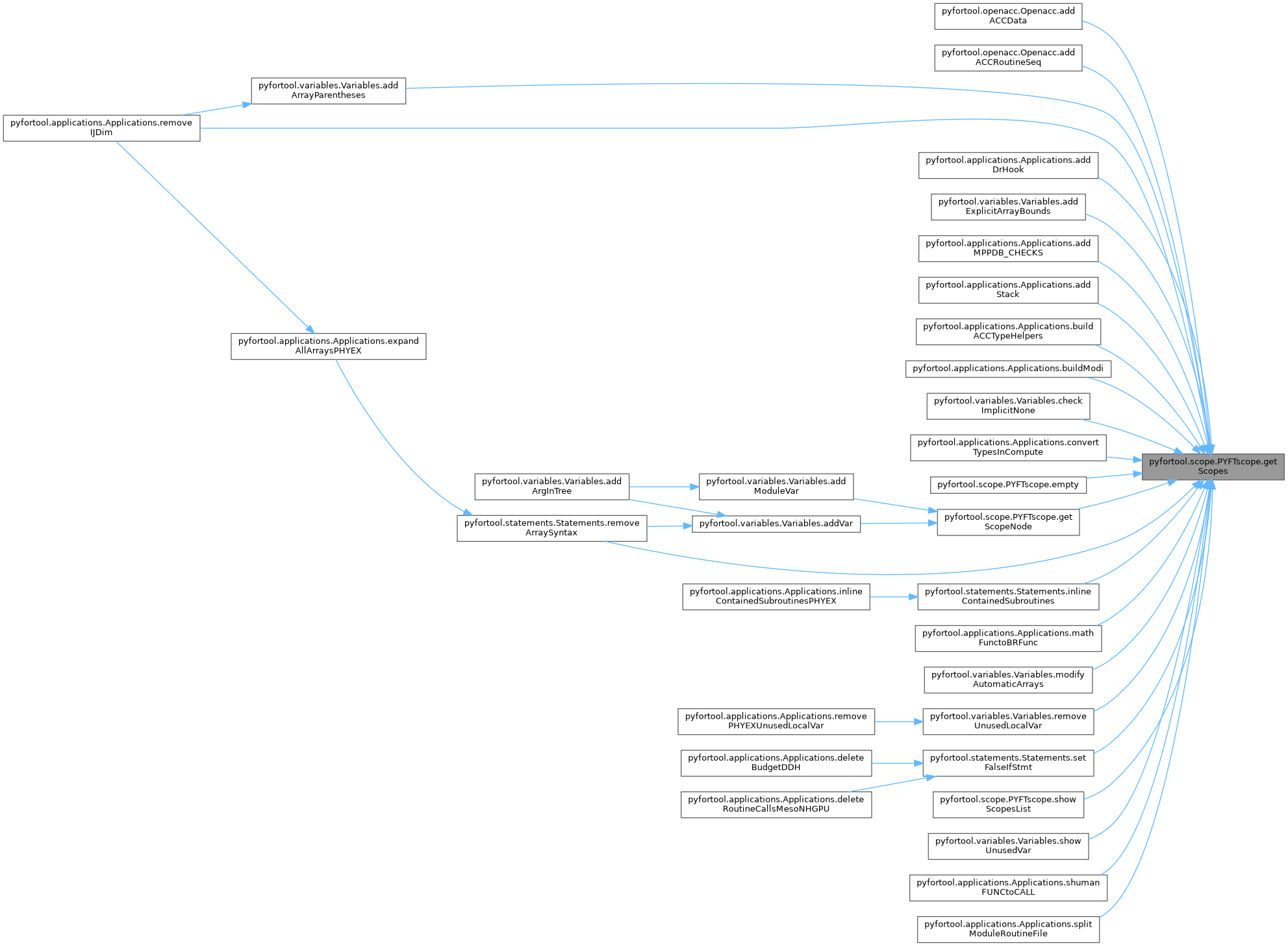
◆ getSiblings()
| pyfortool.scope.PYFTscope.getSiblings | ( | self, | |
| item, | |||
before = True, |
|||
after = True |
|||
| ) |
:param item: item whose siblings are to be searched :param before: returns siblings before :param after: returns siblings after By default before and after are True so that all siblings are returned
Definition at line 313 of file scope.py.
Here is the call graph for this function:

Here is the caller graph for this function:

◆ isScopeNode()
| pyfortool.scope.PYFTscope.isScopeNode | ( | self, | |
| node | |||
| ) |
◆ mainScope()
| pyfortool.scope.PYFTscope.mainScope | ( | self | ) |
◆ normalizeScope()
|
static |
◆ parentScope()
| pyfortool.scope.PYFTscope.parentScope | ( | self | ) |
◆ path()
| pyfortool.scope.PYFTscope.path | ( | self | ) |
Return the current path
Reimplemented from pyfortool.variables.Variables.
Definition at line 264 of file scope.py.
Here is the caller graph for this function:
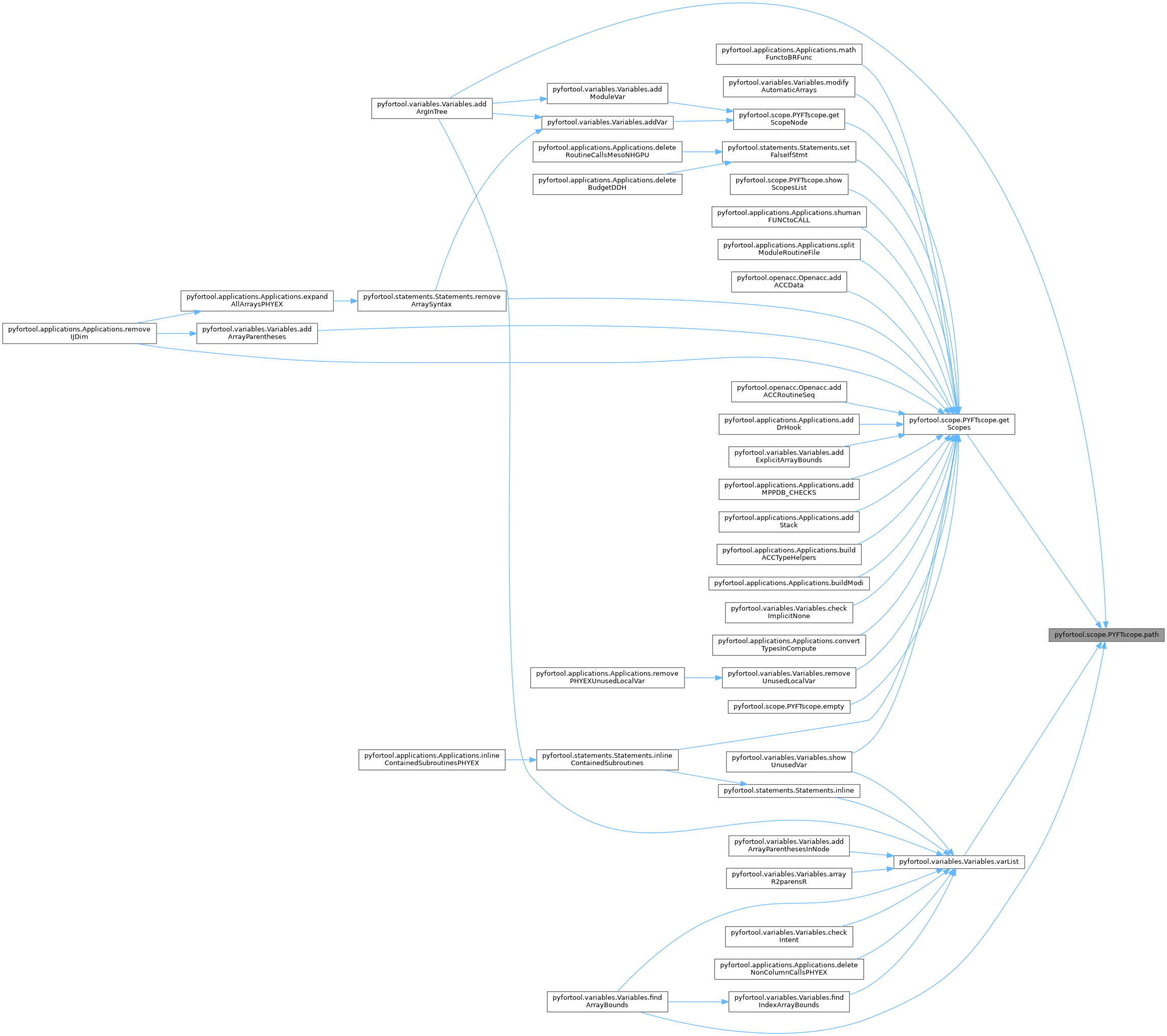
◆ showScopesList()
| pyfortool.scope.PYFTscope.showScopesList | ( | self, | |
includeItself = False |
|||
| ) |
Member Data Documentation
◆ _cacheParent
◆ _mainScope
◆ _parentScope
◆ _path
◆ path
◆ SCOPE_CONSTRUCT
|
static |
◆ SCOPE_STMT
|
static |
◆ tree
The documentation for this class was generated from the following file:
- /home/runner/work/pyfortool/pyfortool/src/pyfortool/scope.py


